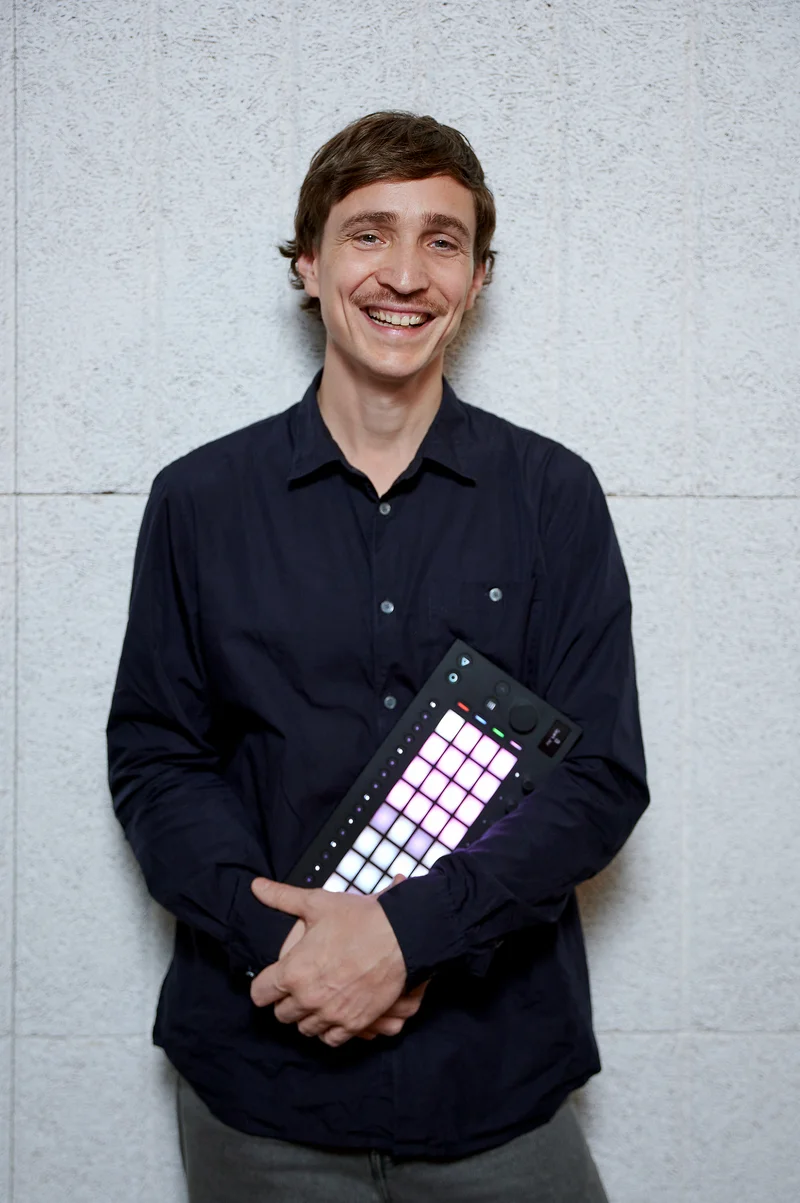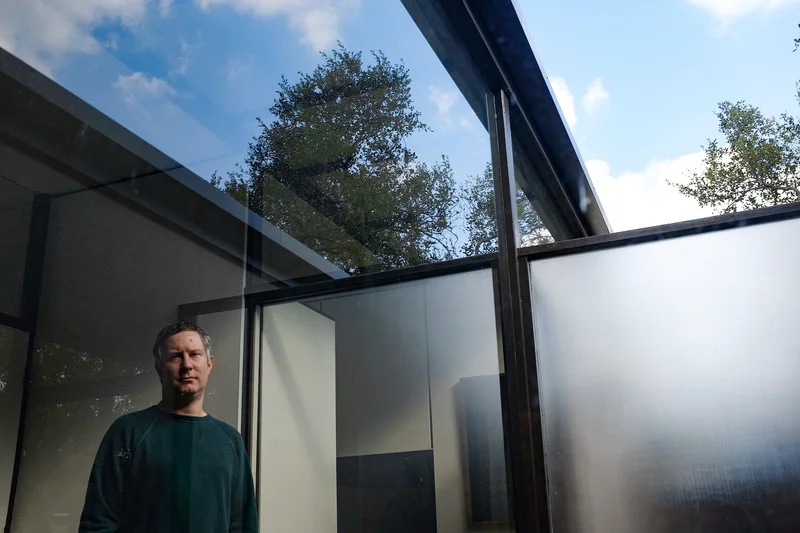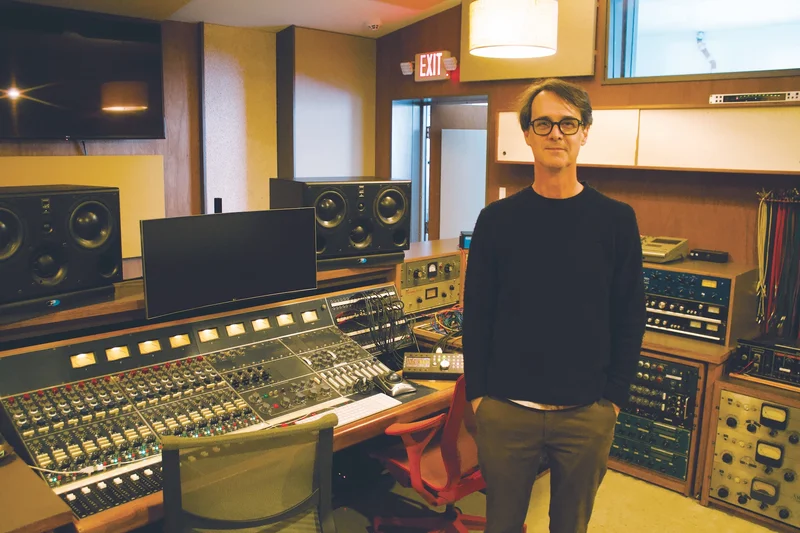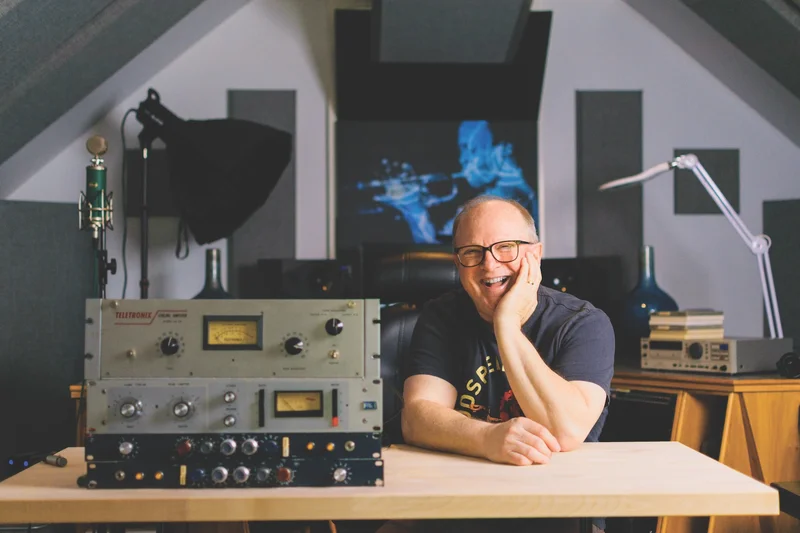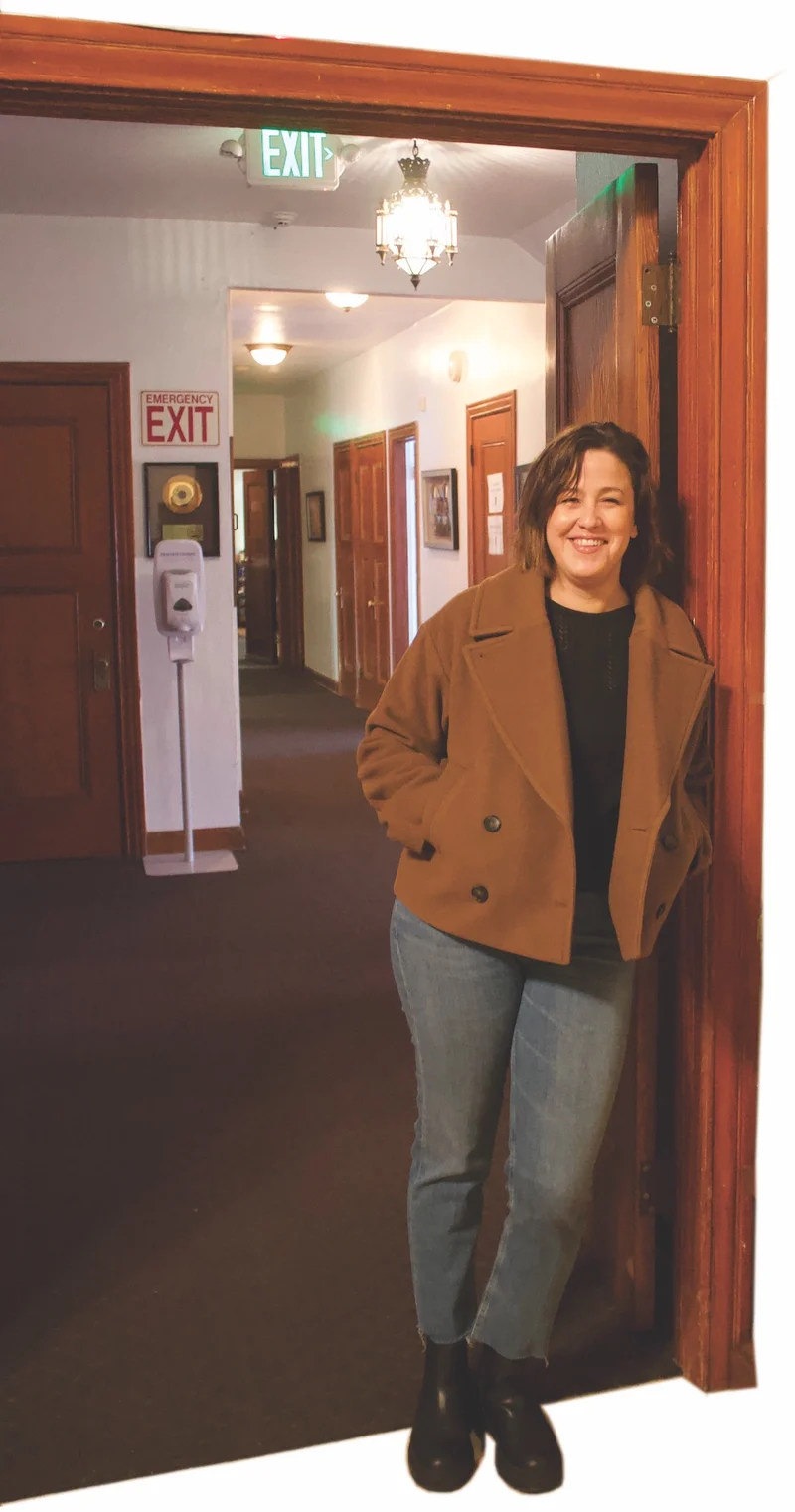These days, with computers and all, a lot of people have recording equipment sitting around before they start making music. Was that the case with you?
As soon as I turned 16, I was playing instruments, and then my mom brought home one of those white MacBooks with GarageBand. I played around with that, but I never really did anything on it. Eventually my friend, Jeremy, got me this little Fostex VF-80 sketchy 8-track recorder with built-in effects and a funny mastering section. It had a 16 GB drive on it. That's what I learned on, in a way. It was plugging into the weird little preamps and seeing what I could do, but it worked. A lot of the Makeout Videotape music [Mac's old band] was done on that. I brought it to Vancouver. I brought it to Montreal. Eventually, the guy who used to play bass guitar in my band, Pierce [McGarry], was like, "Nah, dude. Tape, tape." So I got a 4-track; a Tascam 244. Even when I was 17, and cheap, I was into John Maus, Ariel Pink, Tomita [Isao], and R. Stevie Moore. They were all doing it at home. It sounded sketchy, but I was like, "Ah, I want that sound." You buy a little 4-track off Craigslist for $200 – well, the songs are different, but the sound is definitely there. Luckily I had a bunch of gear. It came to me from being in high school and playing with other bands. I had mics, and my little brother took drum lessons so I had a set, a couple amps, and my guitar equipment. Then I threw [in] mics wherever I could, and saw what I could get.
What mics were you using?
I had a bunch of [Shure SM]57s. For some reason I had a couple of the [Shure] BETA 58As and BETA 57s. I had no idea. I was like, "Mics; cool!" My friend gave me what I think was a Roland DR-80C, some really entry-level condenser mic that I don't think they even make anymore. But I used it on everything. Acoustic guitar, vocals, drums – even on a lot of the Mac DeMarco records. I had a RØDE NT2A that my other friend gave me, but I ended up trading that for a little open-faced 8-track reel-to-reel machine. It sounded too crispy to me. I thought, "Nah, I don't know about this one."
Were these tape machines staying in good repair?
The belt would get fucked up, so I'd need to take one out of another tape deck. Or I would have to call Tascam and say, "Yo, do you guys have one of these somewhere?" The funny thing is I've had that since like 2008, and I've never cleaned the heads on it once. It's funny to me because some of the older recordings I did on it were so blown-out and hissy, but I've had other recordings without changing the machine at all that sound clear and crisp. Now it's in really bad shape, but I can still turn it on and mess around every once in a while. With larger tapes, like 1/4-inch, 8-track, I started to get track dropouts and weird shit happening. Then I learned about isopropyl alcohol. I bought a tape demagnetizer off eBay. The only time I had anyone else come in was when I bought this big, nasty TEAC [deck]. I got it for $400 in Saint-Lazare [near Montreal]. It was a drive, and we had to take it down these stairs. It was a 16-track, 1-inch machine made for home use. But even when it came out, people were like, "This sucks." I had no idea. It was working a little bit, but I ended up destroying the bias oscillator. This guy Garfield [Lamb] works out of that studio Hotel2Tango [Tape Op #47], in Montreal; he'd come over, but it was beyond repair. All that I ended up getting out of the machine was a bunch of marks from leaving a soldering iron on my linoleum.
So were you releasing music as Makeout Videotape, at that point?
The Makeout Videotape music was with the Fostex. Then there was a little EP in the middle called Eating Like a Kid that I did on the [Tascam] 244. I went back to the [Roland] VF-80 for another album called Ying Yang, and from there on I used the 244 more and more. I did Rock and Roll Night Club on that 244, except one song that was done on the VF-80.
And when you did Rock and Roll Night Club you were in Montreal?
Yeah. That would've been probably 2011 or 2012.
Is that where you made the album 2 as well?
I had a little apartment in Montreal that me and my girlfriend shared, and I made that there. Rock and Roll Night Club was made in another apartment, around the corner.
That record sounds deep. As in literally deep. What was in your microphone collection when you made Rock and Roll Night Club?
I think I used a 58 for all the vocals and the drums. Everything was getting slowed down, and all the guitars and basses were super slimy, DI-style.
Why were you slowing things down?
I was trying to make a Ramones record. I used to do everything in open tuning, with melodic guitar playing. But then I thought, "I'm going to do basic power chord riffs, I'm going to do solos, and I'm going to do it really fast." It turned out I'm awful at it. When I slowed things down it was like, "Ah, now I've got something." It's when I learned to ping-pong the 4-track too, so I would do three tracks, bounce it to one, do another three, and hopefully the song would be done by then. If I bounced it to one again, it would sound so savage. I'd learned about it from The Beatles, but they obviously did it from one 1-inch, 4-track to another, so they didn't lose a lot of shit.
This is really complex work. Did you have any instructional materials or helpful friends while you were learning the tricks of the trade?
With the ping-pong thing, I had the 4-track still and I hadn't used it in a while. I was using that VF-80 still. Then I got into a lot of Joe Meek [Tape Op #100] music, like the I Hear a New World album.
Ah, that record is so good.
Oh, it's amazing, yeah; but it's super blown out and tape-y. So I realized, "Okay, I'm going to figure out how to 4-track again." Because the Tascam 244 has a little mixer built into it, you have to pan things so they don't bleed into other channels. I thought, "Well, if I pan everything to this channel, and then engage this one channel, then everything's right there." And then I was like, "Uh-huh, now we're chilling."
What were you using to mix, at the time?
For effects, I used this little Alesis MicroVerb 4 for everything. I ran the vocals and guitars through it. As far as mixing went, it was whatever I could do on the machine. Honestly, for the guitars, I cranked the parametric EQs as high as they could go. Then I cranked the gain and tried to cut all of the bass out of those to let things live in their sketchy zone.
But I feel like that contributed to the distinctiveness of the recordings from that time. It's a very specific vibe.
It wasn't the point in time when I was like, "Ooh, API desk. Neve desk." It was more like, "Ooh... desk!" For 2, and after that, I used a [Fostex] A8. Then I bought this Fostex desk in an alleyway garage sale in Montreal. It was $50. It was so sketchy, and probably entry-level even in 1985, but it sounded legit.
Surely there were equipment changes between the making of Rock and Roll Night Club and 2?
That $50 desk was the 2 desk. And I used the Fostex A8 which, in the end, is probably similar to the quality of the 244, but maybe a little nicer. I just spent more time. I'd never recorded a full drum set until that point, so I put the drum kit in the corner of my apartment and put up a bunch of blankets around it. I had my little shitty condenser mic, and I was like, "Where do I put this?" I finally figured out a placement that maybe some people use, but not for the whole sound. People call it the "fat mic" or something. I was putting it above the kick, looking down at the beater head, and also seeing the snare a little bit. I raised the cymbals and the hi-hat up a little bit, and then played quietly – especially because I was in an apartment. That was the only mic I used for the drums.
Wait, really? So it was a mono overhead?
Yeah, but it's way closer than an overhead. It's almost kissing the bass drum. I would crank the bass; it would give the kick drum a little bit of presence and carve out the mids so they didn't sound super shitty. And the drums I was using at the time were fucked as well. It worked out, though.
Had you experimented with a more complicated microphone setup for recording the drums?
No, not until last year. For Salad Days, Another One, and even Some Other Ones, it's always been the one in the same spot. The drums change, sometimes – I'll get a nicer cymbal, or a nicer snare.
When we were talking about interviewing you, we were like, "Mac's clearly learned more about recording drums on Salad Days."
Hell, no. I started pitching them differently, so I'd record them fast, or record them slow, and that would change the timbre of them a little bit. But that's another trick that I do on everything. On 2, I'd slightly warp things when I sang. On Salad Days I did it on the voice a lot. Listening back, sometimes I think, "This is my 'chipmunk' record," because I sang every song slow.
We saw a video of you recording vocals and guitar in a bathroom. I think it was "Still Together."
I was a kid in that video, actually. "Still Together" is an older song, so I redid it for 2, but I did it in the living room. I had the condenser mic set up, and I sang vocal and guitar into that. Everything for that whole record was done in my living room in Montreal. I had my [Fender] Twin Reverb set up on the couch. The guitars went through a Fender Vibro Champ. I was playing the bass through the Twin, which is why the bass has no butt. It's very plucky. I used a bit of keyboard sometimes, but it's deceptive. I'd play my guitar into a Casio SK-1 and make a patch that way, or I had some crappy thrift store Casio with an organ patch on it.
Sounds like a ton of work. Were your buddies doing this? Would you work for a day, and then go hang out with your buds and talk shop?
No, I closed myself off. The only person that really came in to see me was this guy living across the courtyard from my place. When I was mixing, he'd ask, "Can I come check it out? I'm a musician too." Other than that, Pierce came in and I almost had him sing backup vocals on "My Kind of Woman," but it didn't work out. I stayed at home for a month and figured it out. Now I can think, "Ooh, I want this sound." I'll go on Sweetwater.com, and it'll be here tomorrow morning. But, back then, it was like, "Fuck, this is all I have." I had no money. Even buying reel tape was like, "Fuck, twenty-five bucks!" Luckily there was a place across the street that had a whack load of weird shit.
Were you ever tempted to switch over to digital? If this is between 2012 and 2014, I feel like most people who were doing the DIY thing would get a Pro Tools rig.
I had one of those little [Avid] Mboxes and an Apogee Duet, but I only used them to bounce the stereo out of the board when I was done recording a song. I tried digital when I was still using that digital 8-track [the Fostex VF-80]. I tried Logic, and I was using a little computer. I had a shitty interface, and I didn't understand latency, so I could never get a product out of it. It fuckin' frustrated the hell out of me. It was so much easier for me to use tape. When I was using a 4-track, I'd go to the thrift store, find some blank Type II tapes, and think, "Okay, chill. I can make a record now." If I use a tape machine now, I buy a nice reel. I'll go to the Pro Audio store and get nice reels. But, back then, I was erasing these crusty brown reels that I'd found at thrift stores. It worked out, but that's the funny thing… Even on 2, some of the songs sound way thinner, or more distorted, because of the tape. I was like, "The tape is fucked up, but I already got all the tracks on it, so what am I supposed to do?"
But Salad Days, for instance, sounds super consistent. Did you have access to better tape, at that point?
Yeah, I was going to Mikey's Hook-Up in Brooklyn; I could buy the same kind of reel when I had to do another song.
Did you mix 2 and Salad Days by yourself?
The funny thing about that is that I didn't even consider it mixing at the time. Like I said before, I would record the tracks, set the EQ, listen to all the tracks together, and see if there was something I needed to touch. Everything I've ever done since Rock and Roll Night Club – and even with this new album – always goes through an Alesis Micro Limiter. It's that compressed, squeezed sound at the end of everything that I've ever put out. So, yeah; I'd set the EQ, bounce it, and then I'd have to clear the board and go do another song. So even if I was like, "Ooh, that sounds a little weird," too bad! I couldn't pull up the same mix again. It's not like I wrote it down.
What type of jobs were you working to save up for this equipment?
I did medical studies in Montreal for a little bit at the universities. That didn't pay very well. I did video game testing. Everybody goes through the gamut of doing weird ass jobs there. I ended up working at a grocery store for several months. After Rock and Roll Night Club the label said, "We're going to give you a $1000 advance." At that time, in Montreal, that was 6 months' rent.
Rock and Roll Night Club and 2 were made in Montreal, but Salad Days was made in New York?
It was done in this warehouse space called the Meat Wallet, in Bushwick where I lived with guys from other bands. I had a small, windowless room; but somehow I jammed all the gear in there and made another record.
You lived in that room?
Yeah, we had a bunk bed above [the gear] that me and my girlfriend shared; then all the gear was slammed up against every wall, every corner, and every crevice underneath it.
How come you never brought in band members to help record parts?
I didn't really have a band. With Makeout Videotape, I wrote and recorded everything. It was guitar, floor tom, and snares, so it was pointless to bring someone in anyway. Then, with Rock and Roll Night Club, I was used to that. There's a part of me that's like, "It's my diary-style thing," so I do it alone. On Rock and Roll Night Club, I had a couple of people come over and play guitar solos or do backup vocals; but it was funny, jokey, jovial butt-rock, or whatever. Then, when I did 2, I finally had my own space. It's not like I even had to worry about roommates listening through the walls. Well, I had the family across the hallway, but they didn't complain until I was tracking the last track of drums.
That's lucky. Do you work quickly? Do you finish a song in a day?
That's one thing that bothers me that the label didn't understand at first. There's been instances where they've said, "Oh, we really like this old song. It'd be cool if you re-recorded it." I would say, "Nah, I don't think so." The inception of something, or the moment when it's born, is the realest it'll ever feel. So I like to do that as quickly as possible. Usually, even if I lose something for a day and I come back to it, it'll go unfinished.
So Salad Days came out, and there was a lot of attention paid to that record. You were going on bigger tours with the band. What happened when the time came to make another record?
I moved to Queens. Instead of going for the third record right off the bat, I made a little EP. It was a low pressure environment. I had a good time writing songs one week, made some recordings, made some videos, sent them to the label, and there you go. Similarly, a couple months later, I did the instrumental album [Some Other Ones], which is just me enjoying myself at my house. I did those, and finally I have another real record coming out.
How was the approach for This Old Dog different from the preceding EPs?
For This Old Dog, I got interested in nicer gear. Now I have legitimately nice shit, for better or for worse. I have a bunch of really nice preamps and little sidecars. I have a set of Coles [4038 mics].
It's more intimate, to use a cliché. For one, you're using a lot of acoustic guitar, which is relatively new for you.
I used a computer for this one, so it was different in that way, as well. I asked my sound guy, "Can we get a nice mic?" And he said, "Okay, we'll buy a [Neumann] U87. It's good for a lot of shit." I also got a ribbon mic, which I had never had. A Royer R-121. Then my sound guy said, "If you're gonna get nice mics, you gotta get nice preamps." So I got a couple of those. A four-channel Neve Portico [5024]. Not a lot of flavor to them, but they sound cool. I had a little Apogee Quartet which I was toting around. A lot of the songs on This Old Dog were just me with this nice mic, inputting with a splash of reverb onto it, and enjoying a nice, rich sound. I strayed away from throwing a chorus on everything. I wasn't really thinking of making a record. I wrote 12 to 14 songs in New York in that setup, just keyboard, guitar, and voice. Maybe a little bit of instrumentation, here and there, but not a lot. But then I had them sit. When the time came, the label said, "Well, if you want to put it out this year, you should probably have it done by around New Year's." I've had a lot of qualms with doing it on the computer, and I'm not sure I'll do it again.
What were some of the problems you encountered with the computer that you hadn't dealt with before?
Just too many options. Especially when you get down to mixing, and there're a bajillion plug-ins you can use. Eventually, with this record, I ended up not really using any effects on the computer at all. We used real effects.
What inspired you to switch over to the computer in the first place?
I had done Some Other Ones on the computer, but I was still using that Roland mic and a Zoom H6 [recorder]. I was using the [Apogee] Quartet to output to a little Bluetooth speaker. It was a set up that I could pack in my backpack and use anywhere I wanted. I almost had this retraction from, "Oh, the big tape machine, the desk! It's so heavy, it's so great!" Something that I miss about using lower grade formats, like 1/4-inch tape or cassette, is that when I input something [with tape] and listen back, it's not what I put in, at all. It's distorted and manipulated in all these crazy ways. For me to finally have some sound where I could play it back and be like, "Oh, my god, that's what I'm playing!" That's cool, in some ways, but the tape thing is cool in other ways. With the compact set up, as soon as I got more into it, I got a 16-channel I/O, and then I have all these other desks. You need outboard gear to spice it up if you're using digital.
Were you ever worried, moving into digital, and this "rabbit hole" of outboard gear, that you were going to lose the essence of Salad Days or 2?
I was almost tired of it, in a way. My songs felt like these nuggets. At the time I thought, "There're no dynamics! They're so distorted. There's so much noise all over everything." I love them for that, but even since doing those records, my taste in music has changed a lot. I'm more into synthesizer and ambient music, and I think that certain sides of using digital recording, especially nowadays, lend themselves to that better. Now I've got this hybrid rig because I know what works well on what.
What kinds of things were inspiring you musically for This Old Dog? It's kind of a country vibe, in places.
I've always been trying to make something that sounds like Harvest by Neil Young. Clean, right up in your face. It's not outlandishly loud, by any means. You can crank it up and there's no distortion.
You've got to get that orchestra behind you.
I don't know about that. Unless I can play every instrument one at a time.
What's the pedal steel sounding guitar on the title track, "This Old Dog"?
That's a DI'd guitar with some chorus delay through one of those Ernie Ball volume pedals.
Did you use varispeed at all this time?
"Still Beating" is definitely varispeeded. Which other ones? I mean, little hints, here and there. Especially if I'm doubling a vocal, I'll try to make it seem like two voices. Like I'll tune it down and bring the second voice back up to the original.
Is it hard to time it so the tracks sync up in tempo and pitch?
Well, I'll slow the whole track down and see if I can get the notes. With drums, it's really easy – I can make them sound hip-hoppy and tight. On the computer it's funny, because I forget which original tempo it had, and I can't figure out where 440 Hz [is]. For "On the Level," I changed the key of the keyboards, and then I couldn't hit one of the notes when I recorded the bass. So I sped it up and played the bassline really fast in a higher octave, before bringing it back down.
You've used lots of varispeed on pretty much every Mac Demarco album. It seems like nobody has really picked up on the importance of varispeed to your sound.
The only people that notice are kids who are trying to cover the songs, and they're like, "Why can't I tune my guitar to this? It's not at 440 Hz. It's either a little below or above." So, yeah, I use it a shitload.
There's piano on "Moonlight on the River." Do you own a piano now?
I have a piano in my house [in Los Angeles]. I was trying to record it, which I had never done before. It's almost as interesting as recording drums. I was getting a lot of sounds from it because it's a spinet piano. I looked on Youtube and learned that I could get rid of a lot of clicking by adjusting the whippen screws. All you have to do is pull out the entire action and adjust these screws. What I didn't realize is that getting the action out is easy; it's the getting it back in and not destroying your entire piano that is so difficult. Now I've got this absolutely trashed Spinet piano that's too big to really move. It came with the house, but I completely fucked it up. Now I've got one of those [Yamaha] CP-70s, and that thing is much easier to record. For the record, I actually took my interface over to my friend Brad's place. He rents this nice Yamaha upright, so we used that.
Is your landlord pissed about the spinet?
I own the house, so I'm a little pissed at myself. I found a garage and we floated the walls. I did a pointed roof. It sounded like a cathedral when they finished the renovations. I've got some panels up now, so it's not as heinous, but I was worried. I was like, "Oh, my god, I can't record anything here." If I'm right up at the monitors, it's okay. I've got to fix it up a bit. I want the half live room, half mix room; like The Band. I don't want to have to press record and run into the other room.
Have you helped record anyone else's music?
Just my friends. I lived with this guy, Tall Juan, in Rockaway; I recorded a 7-inch and a couple other tracks of his. He's from Buenos Aires [Argentina]. He's a nice man. And then there's this kid from Japan named Yuki [Kikuchi] who's been around a lot. It's a fluke that we're friends, but he was hanging out at the house in Rockaway. He would play my songs, and my friend Juan Waters' songs, on the guitar. Juan said, "Yo, Yuki, man, you've got to play your own songs." So he wrote his own songs. And then Yuki said, "I want to record them." So I helped him do that. A lot of those recordings turned out really well, too. They're cute. I enjoy doing it, so I'm not in any position to ask for money, or even to extend my, "Please, come record with me." Maybe someday, but right now I feel like I would be letting people down, for the most part.
Well, having traced this whole lineage of your recorded history leading to This Old Dog, it's no fluke. A serious education, wouldn't you say?
I've learned a lot of things, in strange ways.

